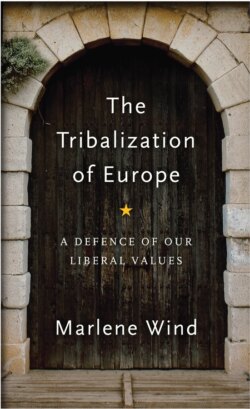Читать книгу The Tribalization of Europe - Marlene Wind - Страница 5
Preface
ОглавлениеPolitics today … is defined less by economic or ideological concerns than by questions of identity.
Francis Fukuyama, Identity
The tribalization of politics is a global megatrend in today’s world. The election of Donald Trump, the Brexit vote, populist movements like Catalan separatism – together with democratic backsliding in Central and Eastern Europe – are all clear examples of the mechanisms and effects of tribalization. The key tendencies here are anti-globalism and identity politics: putting cultural differences before dialogue, collaboration, and universal liberal values.
This book argues that tribalism is pulling up the drawbridge to the world – and to Europe. And it’s not just “the people” who have chosen this avenue. Trump and Brexit have silenced many former defenders of globalism and liberal values because they feel guilty. Guilty that they didn’t see what was coming, and guilty that they ignored the desires of those who now want to put up walls. Along with this a new narrative has come to characterize the debate and the media in numerous parts of the Western world: as we did not predict the rebellion and the identity issues, we now have to embrace the anti-globalists by way of apology and reconciliation.
Tribalism is, however, a dangerous road to go down. With it, and with the retreat of liberal voices, we have put democracy itself in danger. In several places – even in Europe – democracy has already surrendered to illiberalism, by eliminating free elections, an independent judiciary, a free and critical press, and closing down those universities that didn’t parrot the leaders of the countries which hosted them. In this sense democracy has already died, just without us noticing it. Tribalism is not just about being pro-nation, anti-EU, and an opponent of supranational institutions and conventions. It is in many instances a bigger and more fundamental movement casting aside all insistence on the liberal democratic principles we once cherished and insisted were defining for our time.
By succumbing to the identity politics that we see in many places and by reducing democracy to “the will of the people” without discussing who the people really are (or should be), we are abandoning the rights, ideas, and principles we have fought for since the end of the Second World War. Rights, ideas, and principles that millions of Europeans, Americans, and Canadians as well as people of several other nationalities died for on our behalf.
At a time when (former) defenders of liberal values are increasingly silent, or have even joined the growing chorus of tribalists, this book is a wake-up call. By using clear, empirical examples pointing out the dangers of identity politics and the insidious logic behind it, the book encourages people to stand up for true democracy and rule of law in Europe. Democracy is not just “the will of the people” in simple numerical terms but is also about respecting fundamental values, minorities, a free and critical press, and independent courts.
There are several people I need to thank for helping me write this book. First of all, however, I have to thank Ana Rosa and Dolores Cruz Arroyo from Espasa.es for convincing me that this book just had to be written, after a thorough discussion of democracy, separatism, and Balkanization with Carles Puigdemont and my colleague Professor Christian Rostbøll at Copenhagen University in January 2018. I would also like to thank Professors Carlos Closa and Juan Mayoral for comments, corrections, and constructive criticism, as well as those many colleagues at iCourts and the Department of Political Science at the University of Copenhagen who patiently listened to my many thoughts on the subject of this book. I am also highly indebted to my research assistants Regitze Frederiksen, Louise Solgård Hvass, Amalie Lund Michaelsen, and Caroline Emilie Björkenheim Rebien for tireless work on copy-editing, commenting, and source-searching, and not least to Adrian Nathan West for magnificent language editing. Finally, yet importantly, I want to thank my family for their patience with me on this project. My husband Kristian patiently listened to my arguments and my two sons Carl and Jakob never failed to debate with me and test my arguments. I remain indebted to them for their continuous encouragement and interest.
